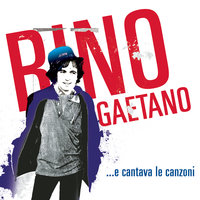 Song information On this page you can find the lyrics of the song Agapito Malteni il ferroviere, artist - Rino Gaetano.
Song information On this page you can find the lyrics of the song Agapito Malteni il ferroviere, artist - Rino Gaetano. Date of issue: 22.06.2015
Song language: Italian
 Song information On this page you can find the lyrics of the song Agapito Malteni il ferroviere, artist - Rino Gaetano.
Song information On this page you can find the lyrics of the song Agapito Malteni il ferroviere, artist - Rino Gaetano. Agapito Malteni il ferroviere(original) |
| Agapito Malteni era un ferroviere |
| viveva a Manfredonia giù nel Tavoliere |
| buona educazione di spirito cristiano |
| ed un locomotore sotto mano. |
| Di buona famiglia giovane e sposato |
| negli occhi si leggeva: molto complessato |
| faceva quel mestiere forse per l’amore |
| di viaggiare sul locomotore. |
| Seppure complessato il cuore gli piangeva |
| quando la sua gente andarsene vedeva |
| perché la gente scappa ancora non capiva. |
| Dall’alto della sua locomotiva |
| La gente che abbandona spesso il suo paesello |
| lasciando la sua falce in cambio di un martello |
| ricorda nei suoi occhi nel suo cuore errante |
| il misero guadagno di un bracciante. |
| Una tarda sera partì da Torre a Mare |
| doveva andare a Roma e dopo ritornare |
| pensò di non partire o pure senza fretta |
| di lasciare il treno a Barletta. |
| Svelò il suo grande piano all’altro macchinista |
| buono come lui ma meno utopista |
| parlò delle città di genti emigrate |
| a Gorgonzola oppure a Vimercate. |
| E l’altro macchinista capì il suo compagno |
| felice e soddisfatto del proprio guadagno |
| e con le parole cercava di calmarlo |
| fu una mano ad addormentarlo. |
| (translation) |
| Agapito Malteni was a railway worker |
| he lived in Manfredonia down in the Tavoliere |
| good education with a Christian spirit |
| and a locomotive at hand. |
| From a good young family and married |
| in his eyes you could read: very complex |
| he did that job perhaps for love |
| to travel on the locomotive. |
| Although complexed, his heart was crying |
| when his people saw him go away |
| why people run away still did not understand. |
| From the top of his locomotive |
| People who often leave their village |
| leaving his sickle in exchange for a hammer |
| remember in the eyes of him in his wandering heart |
| the meager income of a farmhand. |
| One late evening he left Torre a Mare |
| he had to go to Rome and then return |
| he thought not to leave or even without haste |
| to leave the train in Barletta. |
| He revealed his grand plan to the other driver |
| good like him but less utopian |
| he spoke of the cities of emigrated people |
| in Gorgonzola or in Vimercate. |
| And the other driver understood his companion |
| happy and satisfied with their earnings |
| and with his words she tried to calm him down |
| it was a hand that put him to sleep. |